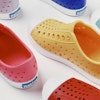Hoka
Ergonomic running footwear with responsive cushioning

Hoka's Sustainability Rating
Acceptable
Raw Materials
Commons couldn't find information on the overall proportion of materials this brand uses. We assume larger brands are still dependent on high emissions synthetic materials. It makes products with a mix of lower emissions materials, including bio-based EVA and recycled polyester, as well as high emissions materials such as EVA, PEBA foam, polyester, TPU, and rubber. It uses LWG-certified leather, but the vast majority of its rubber is not certified or recycled. It plans to reduce its reliance on high impact materials with a goal to increase the proportion of renewable or post-consumer/industrial resources by 2030. Commons was not able to find recent reported progress on this goal within the last year. We require large brands to report at least annually on any stated goals.
Energy Use & Production
Hoka's parent company, Deckers, reports using 100% renewable electricity in its offices and using some renewable energy at its production sites. Deckers also has general energy efficiency projects at its production sites and offices. Hoka sources and manufactures its materials globally, which is standard practice in the fashion industry.
Packaging & Distribution
Hoka's parent company, Deckers, reports that 98% of its footwear packaging overall is recycled and/or FSC-certified. It doesn't note what packaging materials it uses for non-footwear items. Hoka doesn't share much information at a brand level beyond noting that it uses recycled paper. i
Repair & Care
Hoka doesn't offer repair services or support. Hoka offers a 1 year warranty for manufacturer defects. It gives detailed and environmentally conscious care instructions for its footwear.
Take Back Programs
Commons couldn't find information on any take back programs.
Slow Fashion
Hoka offers a core evergreen collection. It limits new additions and releases.
Marketing
Commons is still evaluating this brand's marketing emails.
Transparency & Reporting
Hoka has a prominent but bruef sustainability page on its site. This page provides all relevent reports and policies and was last updated in 2023. Its parent company, Deckers, has a detailed annual report, with a clear, impact driven strategy and progress reporting. Its latest annual report is from 2023 (FY24).
Emissions Tracking
Hoka's parent company, Deckers, internally measures its overall emissions on an organization-wide level. It also conducts some product-level LCAs. It identifies its top driver of emissions, by including detailed breakdowns. In its 2023 update, its estimated total emissions footprint was 1,082,688 MT CO2e.
Emissions Targets
Hoka's parent company, Deckers, has SBTi-approved emission reduction targets for 2030 from a 2019 base year. It last shared progress on these targets in 2023 and was on track for some of them. Commons couldn't find verification that it offsets any emissions.
Supply Chain & Labor
Hoka's parent company, Deckers, publishes information about its overall supply chain partners on Open Supply Hub. It has a supplier code of conduct, which includes provisions banning forced labor. Its code of conduct doesn't address unauthorized subcontracting, living wages, the right to collective bargaining where not allowed by law. It doesn't conduct regular partner audits, which can increase human and environmental risk.
Hoka receives a Fair rating because its parent company has made some progress, but still has room to improve.
Hoka's parent company publicly reports on its emissions impact. It has SBTi-approved reduction targets and has reported progress in the last year, though it was only partially on track. It uses 100% renewable energy in its direct operations, and an unknown portion in its broader supply chain. It identifies this supply chain on Open Supply Hub. Hoka uses primarily recycled and/or FSC-certified packaging.
However, there are very few sustainability initiatives at Hoka at the brand-level. It's still reliant on high emissions, fossil-fuel based synthetic materials, and doesn't offer any repair or takeback programs. Hoka's parent company shares a supplier code of conduct, but its not as stringent as we'd hope for a brand its size, which can increase human and environmental risk.
Hoka is owned by Deckers.
Our ratings are based on a scale from 1 (bad) to 5 (best). How we rate →
https://deckers.com/sites/default/files/pdf/FY24%20Deckers%20Creating%20Change%20Report.pdf
https://www.hoka.com/en/us/hoka-sustainability/
https://www.hoka.com/en/us/recovery-comfort-shoes/restore-tc/1134532.html?dwvar_1134532_color=DOTN
https://www.hoka.com/help-center.html?a=How-Can-I-Wash-My-Hoka-Footwear---id--ap28lxmxQbmApfEnyCsSGQ
https://www.hoka.com/help-center.html?a=What-is-the-Warranty-for-HOKA(r)-Footwear-and-How-Does-This-Work---id--Y9Li5i7gQqq_0bvuleAKPw
https://sciencebasedtargets.org/target-dashboard
https://www.deckers.com/sites/default/files/pdf/Deckers%20Ethical%20Supply%20Chain%20Supplier%20Code%20of%20Conduct.pdf
Get Rewards
Earn for sustainable purchases
Commons rewards you for sustainable purchases from all our Top Rated brands, plus thousands of everyday purchases — from thrift stores to public transit.
Learn more about rewards ->








